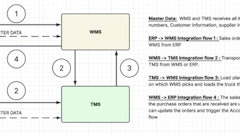
From strict regulations to growing consumer demands to show where products are coming from, transparency is a top concern for food and beverage companies today. In addition to increasing pressure, business leaders have to worry about potential revenue loss resulting from food safety recalls, which can cost companies $30 million per year, according to the Grocery Manufacturers Association.
So how can the multifaceted food supply chain industry quickly and efficiently modernize to meet these demands? By deploying rugged mobile technology throughout the supply chain.
Many food producers, manufacturers and distributors are turning to rugged mobile technology to digitally transform business operations and make them more effective for increasing overall visibility. Investments in rugged mobile technology not only enable companies to deliver more reliable, accurate and robust track and trace processes from sourcing to delivery, but also help to increase a company’s trustworthiness among consumers. By integrating these automated processes into the supply chain, companies can address existing business challenges, comply with Food and Drug Administration (FDA) regulations, and ultimately, set themselves up for success today and in the future.
The following reasons exemplify why deploying mobile solutions throughout the supply chain can help companies increase overall transparency from source to consumption.
Meet regulations & improve quality control
With foodborne illnesses costing the United States up to an estimated $93.2 billion per year, companies working in the food industry must be very cautious to make sure that all safety compliances are met throughout the supply chain. This is essential because anything that falls through the cracks can cause a halt in operations and cost businesses thousands, if not millions.
While companies are struggling to comply with the FDA’s Food Safety Modernization Act (FSMA), reliable enterprise-grade mobile devices equipped with automatic identification and data capture (AIDC) systems, such as barcode or Radio Frequency Identification (RFID) technology, can be used to improve quality control. These Internet of Things (IoT) technologies enable increased insight into the supply chain through all stages of food production by automating data collection and making it readily available to employees and employers. This real-time data collection ensures that companies are meeting traceability requirements and allows business leaders to check the status of any given product at a moment’s notice – all critical components to meeting regulatory demands.
Rugged technology is also very important to safety compliance in the food industry because these devices are built to withstand drops, unlike consumer-grade devices that can shatter, causing the potential for glass to obstruct the food production process. When a situation like this occurs, producers or distributors are then forced to shut down operations and dispose of any product that could have been compromised, resulting in a loss in revenue that could have been avoided.
Reduce error & save costs
Along with providing much needed transparency in the supply chain, IoT and mobile technologies help reduce the possibility for error by automating many tasks that were once accomplished through manual pen and paper processes. By reducing human error, companies can not only meet transparency expectations from the FDA and consumers, but also enhance productivity and profitability by enabling workers to report information accurately and in real time. As employees can work more quickly and effectively using advanced mobile track and trace technologies, business leaders are better equipped to monitor production rates, adjust workflows and use these error-free insights to make decisions that will better impact revenue and customer satisfaction.
Deploying mobile solutions benefits the entire food supply chain, from farm to table. And with transparency demands only expected to rise due to a lack of trust from consumers and increasing regulations from the FDA, businesses must modernize their technology now to protect their bottom line today, tomorrow and long term.



















